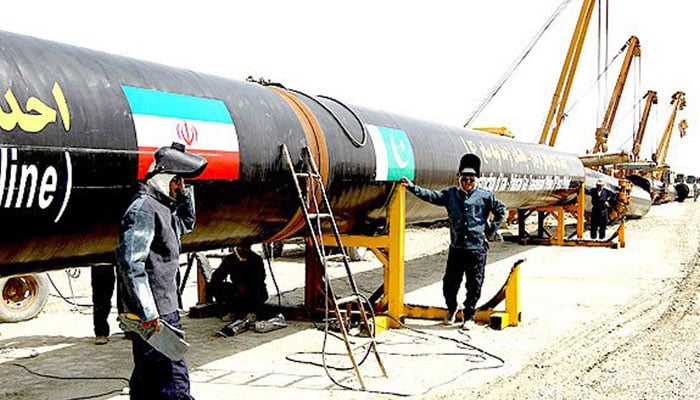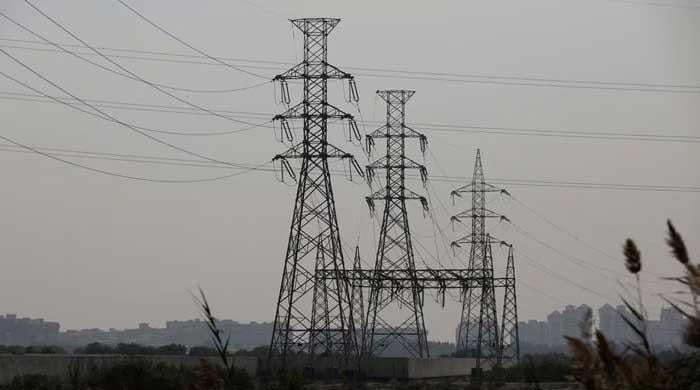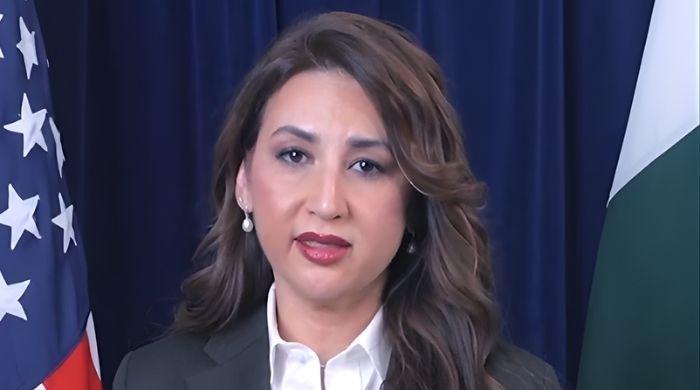Pakistan hires law firms for arbitration on gas pipeline issue with Iran
Islamabad is bound to pay $1 million per day to Tehran from January 1, 2015, under penalty clause
October 30, 2024

- Unable to proceed with project due to US sanctions: govt officials.
- French Arbitration Court does not recognise Washington's sanctions.
- As per contract, Pakistan is obliged to erect its pipeline by 2024.
ISLAMABAD: Pakistan has hired the services of three law firms to contest its case in the Court of Arbitration in Paris after it was moved by Iran over Islamabad's failure to complete its portion of the bilateral gas pipeline and have an intake of 750mmcfd gas, The News reported on Wednesday.
Law Division and Attorney General's Office sources have said that the federal government has acquired the services of White & Case, Three Crowns, Willkie Farr Gallagher — well-reputed international law firms — and one main counsel, settled in Australia, who is also famous in the world as one of the leading lawyers in the oil and gas infrastructure sector.
"We submitted with the secretariat of the France-based Court of Arbitration on October 18, 2024 details about the legal team that would represent Pakistan in the Arbitration Court proceedings," said the sources.
Meanwhile, relevant authorities have briefed the law firms and one main counsel on the Iran-Pakistan (IP) gas pipeline project and the reasons why Pakistan failed to materialise the trans-nations project.
"Pakistan will now, with the consultation of legal team input, appoint one arbitrator. Likewise, one is to be appointed by Iran, and then both states would jointly nominate the third arbitrator. This is how the Court of Arbitration would be completed for proceeding on the case, added the sources.
Once the Arbitration Court is completed, the case is likely to be decided in one year's time. Earlier in August 2024, Iran served the final notice on Pakistan informing Tehran is left with no option but to move the Paris Arbitration Court in September 2024 against Pakistan for not constructing the pipeline under the IP gas project during the extended 180-day deadline.
The project has been facing a 10-year delay since 2014 over proposed US sanctions on the project. The GSPA (Gas Sales Purchase Agreement) was signed in 2009 under the French law. The Arbitration Court is the forum to decide disputes that arise between two countries.
The French Arbitration Court does not recognise US sanctions.
The Inter-State Gas Systems (ISGS) of Pakistan and the National Iranian Gas Company (NIGC) inked the revised contract in September 2019. Under the contract, Iran would not approach any international court if there was a delay in the construction of the pipeline.
Pakistan, however, would erect its pipeline by 2024 after which it would have an intake of 750 million cubic feet of gas from Iran daily.
Under the revised contract, Pakistan was bound to erect the portion of the pipeline in its territory till February-March 2024. Iran facilitated Pakistan and extended the 180-day deadline that expired in September 2024. The authorities, however, again failed to lay down the pipeline. Then Iran served its final notice.
Under French law, if Iran does not exercise its right to move the Arbitration Court till September 2024, it will lose its right to initiate a legal battle against Pakistan. Iran earlier issued its second legal notice to Pakistan in November-December 2022, asking Islamabad to construct a portion of gas pipeline in its territory till February-March 2024 or be ready to pay a penalty in billions of dollars.
In February 2019, Tehran had notified Islamabad of its intention to move to the Arbitration Court and threatened to invoke the penalty clause of GSPA. The GSPA was signed in 2009 for 25 years.
"We are simply unable to go with the project due to US sanctions,” senior government officials told The News.
"We tried hard with Americans seeking a US waiver, but the Biden Administration is against the project and the US congressional panel was told by Assistant Secretary of State Donald Lu in March 2024, ‘We have warned Pakistan of serious consequences if it gets in bed with Iran on the IP gas line project'," added the officials.
Under the original agreement, Pakistan is bound to pay $1 million per day to Iran from January 1, 2015, under the penalty clause.
The project was to be implemented under a segmented approach, meaning Iran had to lay down the pipeline on its side and Pakistan was to build the pipeline in its territory.
It was to be completed by December 2014 and become functional from January 1, 2015.
"The authorities in Pakistan had planned to partially implement the IP gas pipeline project by laying down an 81-km pipeline from Gwadar to Iran border to show its seriousness towards the project. But this strategy also could not be implemented," the officials remarked.









